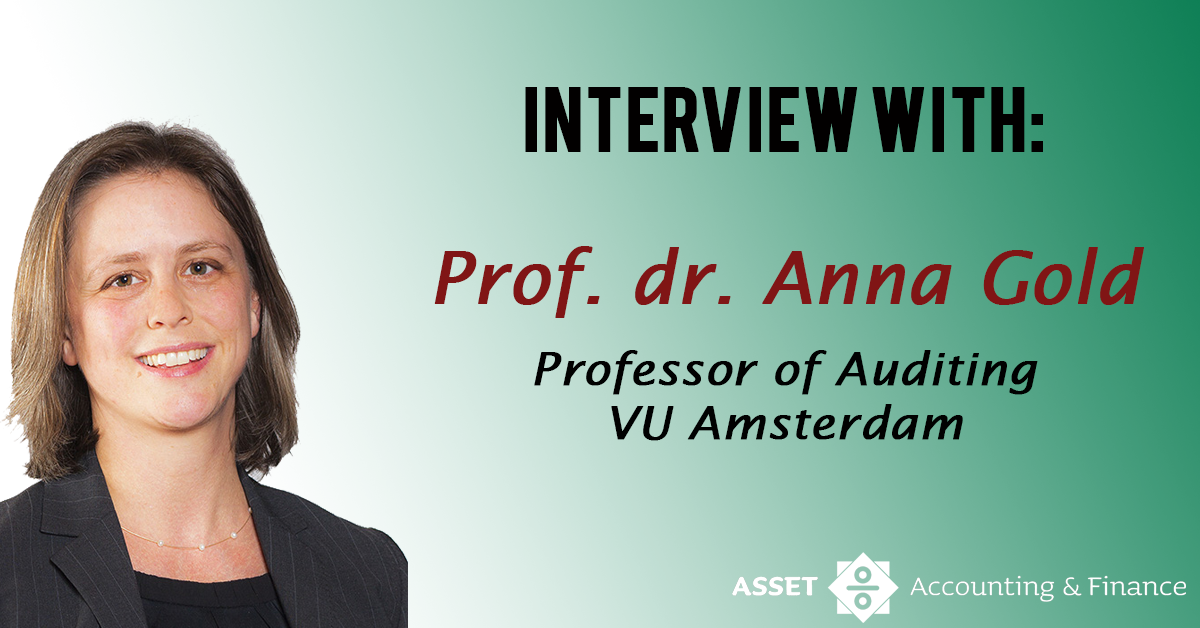In the article “Auditor Errors: Avoid Like the Plague or a Learning Opportunity?”, Anna Gold writes together with Oscar van Mourik, Philip Wallage and Arnold Wright about how auditors and audit firms deal with errors and the extent to which they learn from them.
Can you tell something about yourself, your current position and your career?
I am currently a professor at the Vrije Universiteit Amsterdam, where I teach auditing courses to third year-bachelor’s and master’s students. I also keep myself busy with research. I try to include research topics in my lectures, by trying to find a balance between theory and scientific research. Generally, I am interested in the behavior of auditors, which is influenced by multiple factors. For example, I am currently investigating the triangular relationship between auditors, client management, and the audit committee. Some of my research focuses on how auditors deal with errors.
In the article “Auditor Errors: Avoid Like the Plague or a Learning Opportunity?” you say there is a difference between making an error and committing a violation. Do you think it is possible for accounting firms to clearly distinguish between someone making an error and someone committing a violation?
There is certainly an important difference, but this distinction is, unfortunately, not always made. An error is a situation in which the person wanted to reach the goal, but failed to do so due to an unintended action. A violation, on the other hand, is an act that is intended. It is not always possible to make a clear distinction. In very extreme cases, auditors may even cover up violations by labeling them as errors. However, I don’t believe this happens very often. And I don’t think that’s the biggest problem. A much more common problem is that an auditor, unknowingly, misapplies the rules or standards in practice. From a legal point of view, this is a violation. However, since the violation was unintended, it should be seen as an error and something the individual and the organization can learn from. This does of course create a “gray area”.
“Making mistakes is human. It is important that we dare to talk about errors and learn from them.”
Then there is another area of potential confusion: the concept of “error” versus the concept of “risk”. A large part of the audit process is about risk assessment. How high is the risk of a material misstatement in a given account? Such assessments are made on the basis of information that is currently available. With hindsight and new obtained knowledge, the risk should perhaps have been assessed much higher. In the case of an oversight inspection by the AFM, the audit file will be reviewed often months or even years later, and then, with hindsight, interprets the inadequate risk assessment as an “error” or even a violation. This example shows how difficult it is to clearly distinguish between the concepts of risk, violation, and error.
Do you believe that there is a risk for accountants to be overly penalized for committing an error that is considered a violation, but where there has never been any intentional act? Can you explain this?
The expectation that you will be punished for making mistakes, determines your course of action and openness to admitting errors. The sector is still too deep in the mindset that a mistake is something bad. There are many preventive measures, but there is little understanding for the human aspect of the profession. It must be possible to admit an error without the organization or the regulator immediately considering it as a violation.
The moment you are afraid of the consequences of making a mistake, you are willing to do everything you can to cover up this mistake. This prevents the possibility of learning from errors, since you tend to ignore or even cover up your shortcomings. Moreover, you prevent in all respects the possibility of also learning from errors at the organizational level. Only if you are open about it, a company has a chance to analyze the root causes of the error, and correct any systematic errors. Unless this happens, others will not learn from the error you made. This is an important message that nowadays is starting to get through to organizations who are becoming increasingly aware of the importance of a learning culture.
Do students at the start of their accounting career have to fear making mistakes in the workplace? How should they handle this?
Our research shows that as a trainee or assistant accountant you hardly have to be afraid of making mistakes. You are still in a learning process and that is also recognized by your environment. However, you get promoted to supervisor quite quickly. As you get promoted, it becomes more risky to make mistakes. Then, it is looked at with less understanding. At the same time, the higher the rank, the more you need to give a good example: a manager or partner should talk openly about his or her mistakes in order to keep the threshold for admitting errors low. After all, making mistakes is human and it is important that we dare to talk about errors and learn from them. So, what is especially important as a starting accountant, is that you have to be aware that everyone makes mistakes and, above all, you have to talk about your mistakes. Errors can be a useful lesson for the future, not only for yourself but also for others. You may not immediately run to a partner of the firm in the event of a mistake, but talking to colleagues also creates a culture where mistakes are permissible. As long as you will make a learning moment of your mistake, the environment will respond positively.
Are you interested in actual topics in the accountancy sector? Do you want to meet your potential future employer? Register yourself for Accounting Insight 2019!

















